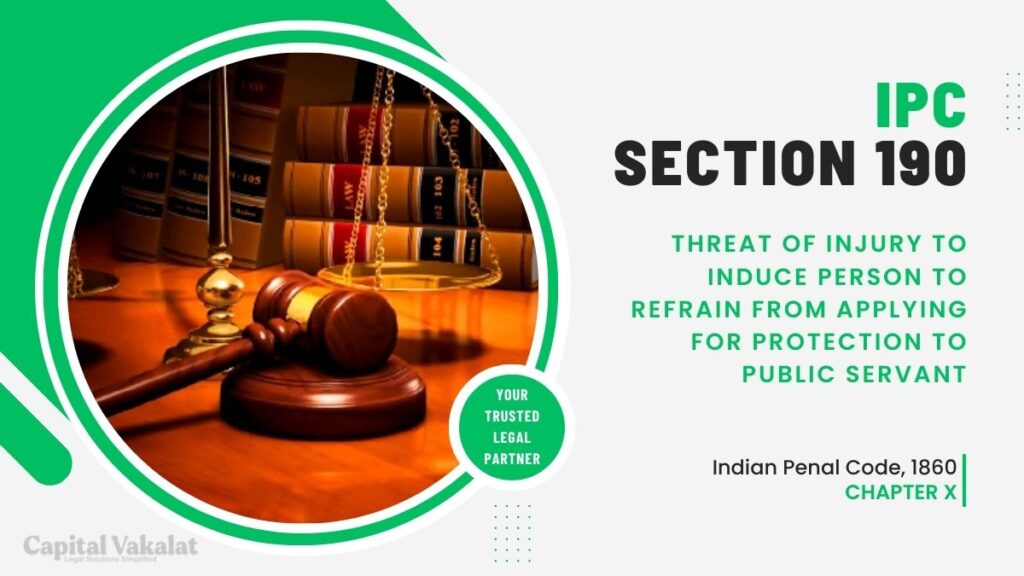In a society that values safety and justice, the law serves as the cornerstone of protection. Section 190 of the Indian Penal Code (IPC) addresses a critical issue – the use of threats to prevent someone from seeking protection from public servants.

This article delves into the details of Section 190 IPC, its implications, and the importance of seeking protection from public servants. It aims to provide a comprehensive understanding of this legal provision.
Understanding Section 190 of the Indian Penal Code (IPC)
Section 190 of the IPC is a legal provision that deals with offenses related to inducing a person to refrain from applying for protection from public servants. It is crucial to comprehend the gravity of such offenses in the larger context of safety and security within a society. This section seeks to deter individuals from using threats as a means of suppressing those who seek help from public officials.
The Menace of Threats and Intimidation
Threats and intimidation are tools that can be wielded by those seeking to silence others. They create an atmosphere of fear, making individuals reluctant to approach public servants for protection. This menace poses a significant challenge to the functioning of a just and fair society.
The Importance of Seeking Protection from Public Servants
Public servants play a vital role in ensuring the safety and well-being of citizens. Seeking protection from them is a fundamental right. It is essential for individuals to have access to legal avenues that allow them to reach out to public servants for assistance when faced with threats or harm.
What Constitutes an Offense under Section 190 IPC?
An offense under Section 190 IPC involves any act or communication intended to induce a person to refrain from applying for protection from public servants. This includes verbal threats, written messages, or any other form of intimidation. The law takes a stern view of such actions and provides safeguards for those who seek protection.
Legal Consequences of Violating Section 190 IPC
Violating Section 190 IPC can result in severe legal consequences, including imprisonment and fines. This underscores the significance of maintaining a just and secure environment where individuals can freely seek protection.
Case Studies Illustrating Section 190 IPC Offenses
To better understand the implications of Section 190 IPC, let’s explore a few case studies that highlight real-life instances of threats and intimidation used to prevent individuals from seeking protection from public servants.
How to Safeguard Yourself and Seek Protection
Individuals facing threats should be aware of their rights and how to seek protection from public servants. This section provides guidance on safeguarding yourself and taking the necessary steps to ensure your safety.
Reporting and Seeking Help
Reporting threats and seeking help is the first step in addressing such issues. Public servants are there to assist, and it is essential to approach them for support.
The Role of Public Servants in Ensuring Safety
Public servants play a pivotal role in maintaining law and order. Their commitment to upholding justice is crucial in creating a safe environment for all citizens.
Public Awareness and Advocacy
Raising public awareness about Section 190 IPC and its implications is essential. Advocacy and education can help individuals better understand their rights and the importance of seeking protection when needed.
The Need for Stringent Punishments
Stringent punishments act as a deterrent, preventing individuals from resorting to threats and intimidation to silence others.
The Burden of Proof
In legal proceedings related to Section 190 IPC, the burden of proof lies with the prosecution. This section explores the importance of providing evidence to establish the offense.
Conclusion
Section 190 IPC is a crucial legal provision that ensures individuals have the right to seek protection from public servants without the fear of threats or intimidation. Upholding this section is essential for creating a just and secure society where the safety of citizens is a top priority.
In a world where safety is paramount, Section 190 IPC serves as a pillar of protection, ensuring that individuals can seek help without fear. Let us all contribute to a society where justice prevails, threats are silenced, and safety is a fundamental right.
Frequently Asked Questions
Can verbal threats be considered offenses under Section 190 IPC?
Yes, verbal threats, as well as any form of intimidation, can constitute offenses under Section 190 IPC if they are used to prevent individuals from seeking protection from public servants.
What should I do if I receive threats and intimidation?
If you receive threats or intimidation, it’s essential to report them and seek help from public servants. They are there to assist you and ensure your safety.
How can public servants help in ensuring my safety?
Public servants play a crucial role in maintaining law and order. They can provide protection, legal support, and resources to help ensure your safety in challenging situations.
What role can public awareness play in addressing threats and intimidation?
Public awareness can significantly contribute to addressing threats and intimidation. It can educate individuals about their rights, encourage reporting of offenses, and advocate for a just and secure society.